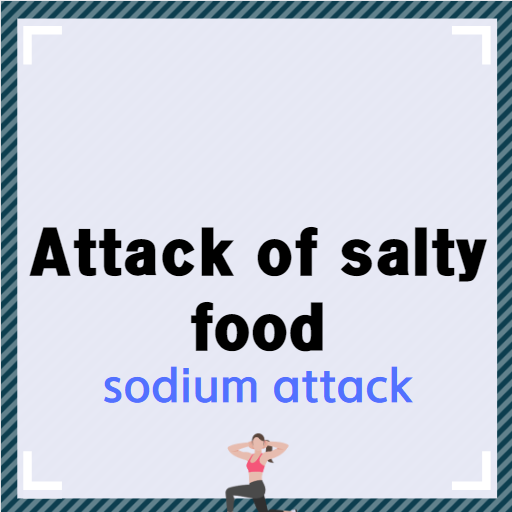A research team at a university hospital recently released a study showing that although the average daily sodium intake of Koreans exceeds the recommended amount, these eating habits do not affect actual mortality. The study is based on examining the relationship between sodium and potassium intake, mortality, and cardiovascular mortality among 143,050 people who participated in the Korean genomic epidemiology study. After following up with the study subjects for an average of 10.1 years, the study found that they ate an average of 2,500 mg of sodium per day. During this period, 5,436 people died, of which 985 died from cardiovascular disease.

The research team divided the deaths into five groups based on sodium and potassium intake and analyzed the effects of sodium and potassium intake on death and cardiovascular death, and found that there was no relationship between sodium intake, mortality, and cardiovascular mortality. However, the higher the potassium intake group, the lower the mortality rate. The overall mortality rate and cardiovascular mortality rate of the group with higher potassium intake were 21% and 32%, respectively, lower than the group with lower intake.
< Index >
Importance of Potassium Intake and the Status of Koreans
In fact, the study’s findings point out that potassium intake should be increased rather than sodium intake. This is because Koreans consume only half of the recommended amount of potassium. Potassium is found in fruits, vegetables, whole grains, and nuts, and bananas, black beans, oranges, green beans, peanuts, avocados, melons, and sweet potatoes are foods high in potassium. However, as the study’s findings are mainly reported under the title that eating a lot of sodium has nothing to do with life, many people are more likely to misinterpret that eating a lot of salt is not a health problem.
In fact, Koreans are consuming an excess of 3,274mg (2018 National Nutrition Survey), whose sodium intake is 1.6 times the daily recommended amount of 2,000mg (5g of salt) recommended by the World Health Organization (WHO). In particular, people who eat a lot of instant food or fast food are eating about 5,000-6,000mg of sodium a day. This excessive intake of salt (sodium) is a cause of high blood pressure, heart disease, stroke, chronic kidney disease, and can cause health harm just like cigarettes.
Historical Changes in Sodium and Potassium and Health Problems
According to an ape study, people in the Stone Age consumed 750 mg of sodium and 11,000 mg of potassium a day. However, modern people consume more than five times the amount of sodium, and potassium is only a quarter of what people in the Stone Age are consuming. This means that we are eating a lot of sodium unnecessarily every day. Therefore, we need a concrete practice of reducing our sodium intake and eating potassium properly.
Chronic diseases caused by excessive sodium intake are classified into four categories: high blood pressure, heart disease caused by high blood pressure, chronic kidney disease, and stroke. These diseases account for 15.1 percent of medical expenses, and they are rapidly increasing in conjunction with an aging society.
Practice and Performance for Sodium Reduction
In order to reduce sodium intake, in Korea, health authorities such as the Ministry of Food and Drug Safety and the Korea Centers for Disease Control and Prevention are establishing and working on comprehensive measures to reduce sodium intake by 30% by 2025, in accordance with the resolutions of the World Health Organization (WHO). As a result of these efforts, the National Health and Nutrition Examination Survey found that the daily sodium intake per person decreased by about 30% from 4,831 mg in 2010 to 3,274 mg in 2018. Sodium is a major component of extracellular fluid that controls the osmotic pressure of blood, and excessive intake contributes to the occurrence of high blood pressure.
Therefore, studies have shown that reducing sodium intake can reduce the risk of cardiovascular accidents by 25-30%. In Finland, as a result of continuous efforts to reduce sodium intake, such as the introduction of high-sodium food labeling, sodium intake has decreased by about a third over 23 years, systolic and diastolic blood pressure has decreased by an average of 10 mmg, and the average life expectancy of the people has been extended by five years.
In addition, eating salty foods, which contain a lot of sodium, increases your desire for sweet foods, leading you to drink a lot of sweet drinks, such as soda and fructose juice, and reducing the effectiveness of the leptin hormone, which inhibits appetite. This increases the risk of obesity by increasing the amount of intake.
Excessive sodium intake is a health threat. More research may be conducted to reveal more facts, but we should not forget that reducing sodium intake is the way to stay healthy.
The summary is as follows.
- There was no association between sodium and mortality, but the higher the potassium intake group, the lower the mortality rate.
- The sodium intake of Koreans exceeds the recommended amount, and the potassium intake is only about half.
- Excessive sodium intake is a cause of high blood pressure, heart disease, stroke, and chronic kidney disease, and can harm health.
- To reduce sodium intake, you need to pay attention to food choices and cooking methods.
- It is important to keep potassium intake at an appropriate level by eating enough fresh fruits and vegetables.
A good article to read together!
📌Importance-performance analysis of sodium reduction practices by school nutrition teachers and dietitians in the Republic of Korea
📌Four effects of arginine intake
